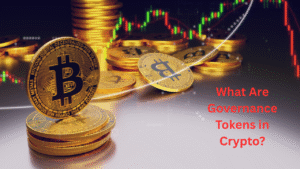 🗳️ What Are Governance Tokens in Crypto? A Deep Dive into Decentralized Decision-Making
🗳️ What Are Governance Tokens in Crypto? A Deep Dive into Decentralized Decision-Making
In the evolving world of blockchain and decentralized finance (DeFi), governance tokens have emerged as a powerful tool for community-led decision-making. These tokens empower holders to vote on key protocol changes, allocate treasury funds, and shape the future of decentralized applications (dApps) and platforms.
🔍 What Is a Governance Token?
A governance token is a type of cryptocurrency that grants holders voting rights within a blockchain-based project. These tokens are typically issued by Decentralized Autonomous Organizations (DAOs) and allow users to propose, debate, and vote on changes to the protocol.
Unlike traditional corporate governance, where decisions are made by a board of directors, governance tokens democratize control by distributing it across the community.
Key Features:
- Voting Power: One token often equals one vote.
- Proposal Rights: Token holders can submit proposals for changes.
- Decentralization: Eliminates centralized control.
- Transparency: All votes and outcomes are recorded on-chain.
📊 Top Governance Tokens by Market Capitalization
Here’s a snapshot of some of the most prominent governance tokens in the crypto space:
| Token | Project | Price (USD) | Market Cap (USD) | Use Case |
|---|---|---|---|---|
| UNI | Uniswap | $8.36 | $4.94B | DEX governance |
| AAVE | Aave | $296.76 | $4.46B | Lending protocol governance |
| CRV | Curve DAO | $0.57 | $766.79M | Liquidity pool governance |
| MKR | MakerDAO | $1,981 | $1.8B | Stablecoin protocol governance |
| COMP | Compound | $45.79 | $425.35M | Lending/borrowing governance |
| YFI | Yearn.finance | $5,412 | $182.38M | Yield optimization governance |
Source: Forbes & CoinMarketCap, July 2025
🧠 How Governance Tokens Work
Governance tokens operate through smart contracts and DAOs. Here’s a simplified flow:
- Proposal Submission: A community member submits a proposal.
- Discussion Phase: The community debates the merits.
- Voting Period: Token holders vote using their tokens.
- Execution: If passed, the proposal is executed via smart contracts.
Example: Uniswap (UNI)
In 2020, Uniswap airdropped 400 UNI tokens to users who had interacted with the platform. These tokens allowed holders to vote on fee structures, treasury allocations, and protocol upgrades.
📈 Chart: Governance Token Performance Over 7 Days
Here’s a visual comparison of 7-day performance for leading governance tokens:
Token | % Change (7D)
------------|---------------
UNI | +7.75%
AAVE | +5.40%
CRV | +5.19%
MKR | +0.03%
COMP | +3.13%
YFI | +3.07%
This chart highlights the volatility and growth potential of governance tokens, which often respond to community activity and protocol developments.
🧪 Real-World Use Cases
Governance tokens aren’t just theoretical—they’ve played pivotal roles in shaping major crypto platforms:
- MakerDAO’s Black Thursday Response: In March 2020, MKR holders voted to stabilize the DAI stablecoin after a market crash, showcasing the power of decentralized governance.
- Compound’s Asset Listings: COMP holders regularly vote on which assets can be added to the lending pool.
- Curve’s veCRV Model: CRV holders lock tokens to gain voting power and influence liquidity incentives.
⚖️ Benefits and Challenges
✅ Benefits:
- Decentralized Control: Empowers users, not corporations.
- Community Engagement: Encourages active participation.
- Transparency: On-chain voting ensures accountability.
❌ Challenges:
- Low Voter Turnout: Many holders don’t participate.
- Whale Influence: Large holders can dominate votes.
- Technical Complexity: Proposals may be hard to understand.
🧭 Governance Tokens: Final Thoughts
Governance tokens are reshaping how decisions are made in the crypto world. They offer a glimpse into a future where users—not centralized entities—steer the direction of digital platforms. As DeFi and DAOs continue to grow, governance tokens will play an increasingly vital role in ensuring transparency, fairness, and innovation.